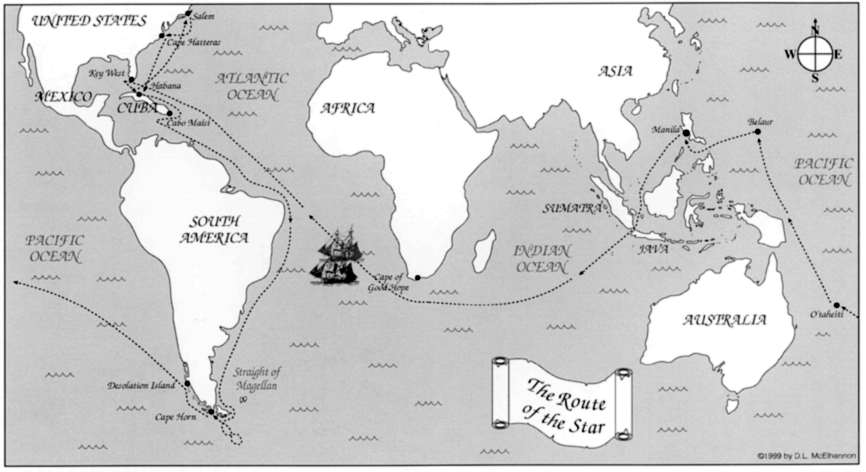Wake of the Perdido Star
Read Wake of the Perdido Star Online
Authors: Gene Hackman


THIS BOOK IS DEDICATED TO
Â
Â
Â
THE SEA
Â
A place of endless mystery, adventure, and beauty.
And to all those who ply its surface and plumb its depths.
A man who studieth revenge keeps his wounds green, which otherwise would heal and do well.
Â
âSIR FRANCIS BACON
CONTENTS
Â
Â
Â
Â
Â

H
AMDEN, CONNECTICUT. 1805. Jack O'Reilly, son of Ethan, gunsmith, walked a step behind his father as they approached First Episcopal Church. A cold wind drove at them, stirring leaves in the twilight, swaying the lantern in the church rector's hand. Ethan turned to his son as they approached the massive archway.
AMDEN, CONNECTICUT. 1805. Jack O'Reilly, son of Ethan, gunsmith, walked a step behind his father as they approached First Episcopal Church. A cold wind drove at them, stirring leaves in the twilight, swaying the lantern in the church rector's hand. Ethan turned to his son as they approached the massive archway.
“You are not to speak at this meeting. Since you insisted on coming, you'll sit in the choir loft. Quietly. Understood?”
Jack felt a familiar knot take shape in his stomach. “Why can't I sit withâ”
“You'll sit where I say or not come in at all.” There it was, the tightness in his voice. He had come to this meeting primed for trouble.
Ethan O'Reilly turned and brushed past three men conversing in the doorway. Jack watched them stare at his father's back, whispering, then made his way inside.
He climbed the steps to the choir loft, a tug on his breeches
alerting him to the presence of other fathers' sons. He turned and they smiled back. They were waiting for the outbursts that characterized these gatherings; knowing his father's mood, Jack couldn't share their eager anticipation.
alerting him to the presence of other fathers' sons. He turned and they smiled back. They were waiting for the outbursts that characterized these gatherings; knowing his father's mood, Jack couldn't share their eager anticipation.
Dreading what he knew would come, Jack sank against the hardwood bench. The other boys were at the far side of the loft, perched as if to watch a schoolyard brawl. Jack looked up; as usual, the warmth of the rough oaken beams seemed to mock the meeting's impersonal chill. He let his eyes fall to the mob below.
The most important politicians and leaders of business had gathered. Jack could see the prim schoolmaster wedged between two fat men who conversed back and forth as if he wasn't there. His father's landlord, wealthy property owner Peter Slocum, sat rigid as a stump beside them, next to his married son. The young O'Reilly stirred. He wished they'd get on with it.
Finally, Mr. Slocum stood and the crowd quieted. He raised his voice in his usual self-righteous protest: “The invasion of foreign heathens, who have taken jobs from the hardworking, God-fearing citizens of this land must be stopped. I, for one, won't hire any of this pack nor continue to step aside for them as they weave their drunken way down our cherished streets. If we're to become a strong nation, we can't be a dumping ground for dark-skinned mongrels and hordes of papists.” He paused, enjoying the applause lauded upon him by his compatriots, although some shifted uncomfortably in their seats. Slocum's eyes settled on Ethan, and he spoke in more deliberate tones, directed at the gunsmith. “There's a privilege here that's being ignored, a privilege granted to us by the pastor of this church to worship and enjoy the sanctity of these hallowed walls. But that
privilege
”âhis voice took on a new volumeâ“can readily be exempted from certain members if they're found to be continually disruptive and combativeâ”
privilege
”âhis voice took on a new volumeâ“can readily be exempted from certain members if they're found to be continually disruptive and combativeâ”
“How dare you speak of foreigners invading this land!”
The crowd gasped. Jack felt his face turn hot; it was his father's voice. As the only Catholics in Hamden, the O'Reillys sat quietly
in the back when they attended the Episcopal ceremonies, not participating in the Eucharist; a fact, Jack felt, not overlooked by the “good people” of the community.
in the back when they attended the Episcopal ceremonies, not participating in the Eucharist; a fact, Jack felt, not overlooked by the “good people” of the community.
Ethan O'Reilly thrust his arm at the landowner. “You, sir, are once removed from a foreign land yourself, as are a score of others in this room.”
Several townsmen rose, shouting back.
Jack could feel the eyes of the other boys on him and didn't know whether to be embarrassed or proud. Most of the seventy-five or so men in the room were livid, but Ethan's voice, full of loathing, rose above them.
“You aim to rile me because of my family's foreign heritage. But let me make this clear: never, and I repeat never, will I be driven from this city because of bigotry and intolerance.”
Jack's ears rang as if they'd been slapped, but he drove all expression from his face.
The mayor, a gaunt man of considerable intelligence, rose from the back of the church. In a black high-collared suit, with starched white shirt and florid kerchief, he was the very picture of a successful politician. “You, sir, are out of order.”
A hush enveloped the room.
“The remarks, sir,” the mayor continued, “were not directed at you or your family, but rather at the riffraff and flotsam that have recently invaded from coastal cities. Stealing, cheating, littering these streets with their unsavory behavior. I also suggest to you, sirâ”
“I need no suggestion from you,” Ethan interrupted in only slightly more measured tones. “Nor can I ignore the implication.”
Jack could see his father's face had turned crimson; he leaned over the rail, scanned the room, and saw a pair of eyes looking up, frozen on him. They belonged to Slocum.
“This nation's independence,” Ethan went on, “so recent even you could not be unaware of it, was built upon the dictum that all men are created equal, and being so, are welcomed into our great
country. This land is populated with foreigners.” Ethan paused to catch his breath. Jack knew his father had gone too far, and being the man he was, would plunge ahead. “The âriffraff,' as you call them, were oppressed in other lands, and have as much right to be here as you gentlemen sitting here smug and comfortable. You seem to have forgotten how this nation was formed.”
country. This land is populated with foreigners.” Ethan paused to catch his breath. Jack knew his father had gone too far, and being the man he was, would plunge ahead. “The âriffraff,' as you call them, were oppressed in other lands, and have as much right to be here as you gentlemen sitting here smug and comfortable. You seem to have forgotten how this nation was formed.”
Several men began stirring and prepared to leave the assembly. Jack could feel his father's frustration.
“This nation was not founded to propagate the notion of an empire, but to free the oppressed, allow freedom of speech, and grant the right to pursue one's God-given talents.” Silence ensued.
Suddenly laughter erupted from various parts of the room. This metalworker had overstepped his bounds. Perhaps realizing this, Ethan stopped, and made his way between the pews of the old church toward the entrance. When he reached the door, he paused, his back to the congregation, and in one swift move he flung it open and slammed it behind him.
Jack felt numb; his friends shifted nervously. He knew his father's words were true, but voicing them so stridently gave them a life of their own, a vision of the villagers' behavior that would be hard for them to accept. The townspeople were nosy and narrowminded but Jack sensed that they probably weren't much different than people in most places. It was just that his idealist father brought out the worst in them. Over the years, in three different towns, Jack had fought schoolyard battles with bullies who made fun of his mother's accent or ridiculed his father's wild-eyed fervor for justice and “rightful authority based on the rule of law, not entitlement.”
Jack rose, staring back at the boys until they averted their eyes. He descended the steep stairs and followed his father out into the night.
By nature, Jack was a loner. Generally liked and respected by his peers, he had still made no close friends in his years at Hamden. Most hours in the day, if not spent beside his father's forge, were
spent reluctantly with books. Not a natural student, he pursued his studies at an age when most young men in Hamden had turned from schooling to more practical matters.
spent reluctantly with books. Not a natural student, he pursued his studies at an age when most young men in Hamden had turned from schooling to more practical matters.
Hunched against the cold, his feet crackling through dead leaves, Jack mulled over the meeting with a heavy heart. He felt events in his life were building toward some change. His father had really angered people tonight. Deep down he knew that his mother would be readily accepted by most of the townsfolk if it weren't for his dad. Despite her Cuban heritage, his mother's featuresâbrown eyes, full lips, and light-olive skinâwere attractive, and she radiated a warmth that disarmed people, accent or no. But Ethan's manner made many uncomfortable. Jack recalled an incident several years earlier in which his father railed against slavery in a public meeting. Although many in the crowd were likeminded, his father's tone had been accusing and unconvincing. After the meeting, a young hooligan, perhaps sensing the gunsmith was unpopular, lobbed a piece of dried horse dung at the O'Reilly carriage as the family was riding home. It hit his mother in the back of her head. Not quite thirteen at the time, Jack quietly wiped her soiled hair with a kerchief while his father launched into a red-faced tirade, threatening mayhem against the retreating schoolboy. Onlookers shook their heads. Two days later, the ruffian who had offended his mother was spotted extricating himself from a manure pile at Harmon's Stables with a black eye and bloody nose. He was afraid to name his attacker but no one doubted it was Jack O'Reilly. Short-lived satisfaction, brooded Jack.
Other books
The Hard Kind of Promise by Gina Willner-Pardo
Demanded by Him (Chosen by Him #7) by Ellie Danes
To Kill Or Be Killed by Richard Wiseman
A Trail Through Time (The Chronicles of St Mary's) by Jodi Taylor
Going Under by S. Walden
More Pleasures by MS Parker
By Honor Bound by Denise A Agnew, Kate Hill, Arianna Hart
An Amish Wedding by Beth Wiseman, Kathleen Fuller, Kelly Long
Billion Dollar Milkmaid by Simone Holloway
No One Wants You by Celine Roberts